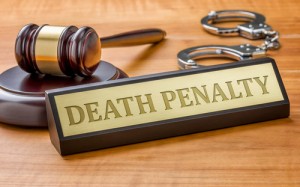SCOTUS reinstates death sentences in 'Wichita Massacre,' cover-up killings; Sotomayor dissents

Photo from Shutterstock.
The U.S. Supreme Court has reinstated the death sentences of three convicted Kansas murderers in a decision with only one dissent.
Justice Antonin Scalia wrote the opinion (PDF) reinstating the death sentences of Reginald and Jonathan Carr, convicted in a notorious spate of crimes in Wichita that left five people dead, and Sidney Gleason, convicted of murdering two people to cover up the robbery of an elderly man.
Justice Sonia Sotomayor was the only dissenter, and her argument was that the Supreme Court should never have accepted the cases for review. Justices Stephen G. Breyer and Ruth Bader Ginsburg joined Scalia’s majority opinion, even though Breyer called for briefing on whether the death penalty is constitutional last June in a dissent that was joined by Ginsburg.
Scalia’s majority opinion in the Kansas cases found there was no need to instruct jurors that evidence mitigating against the death penalty need not be proved beyond a reasonable doubt. The decision also found no need to sever the Carrs’ joint sentencing proceedings.
Scalia’s opinion included a lengthy and gruesome description of the Carrs’ fatal crimes that began with the shooting death of a cellist with the Wichita symphony and ended with the execution-style slaying of four people in a soccer field. One woman survived the soccer field shootings because her hair clip deflected the bullet. Scalia said the Carrs’ crimes included rape, robbery and kidnapping, and he referred to the slayings as the “Wichita Massacre.”
Sotomayor said the court should not have granted cert in a case where the only concern is that a state overprotected its citizens. “We risk issuing opinions that, while not strictly advisory, may have little effect if a lower court is able to reinstate its holding as a matter of state law,” she wrote. The cert grant also prevents states from experimenting with the best ways to guarantee a fair trial, she said.
“The standard adage teaches that hard cases make bad law,” Sotomayor wrote. “I fear that these cases suggest a corollary: Shocking cases make too much law.”
The cases are Kansas v. Jonathan Carr, Kansas v. Reginald Carr, and Kansas v. Gleason.
Related articles:
ABA Journal: “Will the Supreme Court ‘peck away at’ capital punishment?”
ABAJournal.com: “Scalia focuses on murder details during arguments in Kansas cases, notes Breyer’s capital views”
ABAJournal.com: “Supreme Court will consider need to instruct capital jurors on mitigation burden of proof”



